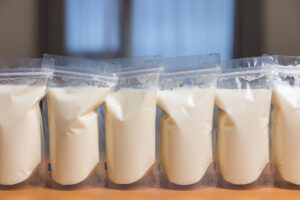If you are breastfeeding, you probably have questions about the nutritional quality you are providing your baby. As a specialized food, breast milk (also known as human milk) is tailored to your baby’s needs, packed with immune-boosting antibodies, and evolves over time as your little one grows. Human milk provides essential nutrients, vitamins, and fats that are critical for the healthy development of infants. But did you know that not all breast milk is nutritionally identical?
Whether you’re a NICU mom, a milk donor, or simply want to understand what’s in your milk, breast milk testing offers an evidence-based way to optimize your feeding plan. Maternal nutrition during pregnancy and for lactating women directly affects the nutritional content of breast milk, which in turn impacts the well being of infants. Certain groups, such as preterm infants or those with specific health conditions, may be at higher risk for nutrient deficiencies, making testing especially important. From fat content and calories to protein density, testing provides a nutritional snapshot of your milk—helping you make informed decisions for your breastfed baby and giving you peace of mind.
In this blog, we’ll explain:
- What breast milk nutritional testing reveals
- Who benefits from it
- When it makes the most sense
- How BoobieJuice makes it easy and accessible
- Why freeze-drying your tested milk is the best way to store it for future use
What Is Breast Milk Testing?

Breast milk testing is a laboratory-based analysis that measures the macronutrient content of your expressed milk. It gives you specific data on:
- Fat content (a major calorie source for babies)
- Protein levels (essential for growth and development)
- Carbohydrates (primarily lactose, which fuels energy)
- Calories per ounce (crucial for weight gain and feeding goals)
Breast milk testing can also analyze the nutritional content, including vitamins, fatty acids, and minerals such as calcium. Understanding the function of these nutrients helps parents support their baby’s growth, immune health, and neurological development.
This breakdown helps parents understand how nutritionally dense their milk is, and whether it meets the specific needs of their baby—especially in cases where more calories or fat are needed. The efficiency of milk transfer and nutrient absorption can impact your baby’s health, and testing provides valuable insight into this process.
Why Breast Milk Composition Matters
Breast milk is dynamic. It changes from day to day, even hour to hour, based on:
- What you eat and drink
- Time of day (evening milk tends to have more fat)
- How long it’s been since your last pumping or feeding
- Your baby’s age and developmental stage
- Your hydration and stress levels
Maternal vitamin intake and the use of a supplement, such as fish oil, can also affect the nutritional quality of breast milk, including levels of DHA and other key nutrients.
This variability is natural—and usually fine. However, deficiencies in important nutrients can increase the risk of developmental issues in children and impact their health throughout life. But sometimes, you need more certainty, especially if you’re supplementing, fortifying, or storing for future use. That’s where testing becomes valuable.
Who Should Consider Breast Milk Testing?

While every breastfeeding mother can benefit from better insight, some parents may find breast milk testing especially important. Women and infants with specific health concerns, such as suspected nutrient deficiencies or developmental issues, may benefit most from testing to ensure optimal nutrition and health outcomes.
At the end of the process, blood tests can sometimes be used alongside breast milk testing to provide a more complete picture of maternal and infant nutritional status, and personalized suggestions can be provided based on the results.
NICU Moms or Preemie Parents
Babies in the NICU or born prematurely, especially preterm infants who have unique nutritional needs and may require closer monitoring of breast milk composition, often have higher caloric needs. A milk sample that seems perfect may actually fall short on calories or fat. Testing ensures your milk is doing the job—and if not, it helps your medical team create a tailored feeding plan.
Parents of Low Birth Weight or Slow-Gaining Babies
If your pediatrician has concerns about weight gain, breast milk testing can confirm whether your milk is calorie-rich enough—or whether supplementation or fortification may be needed.
Milk Donors
When donating milk, especially to milk banks or other families, nutritional transparency can increase trust and confidence. It’s also helpful for donors who want to offer more than just quantity—they want to offer quality, too.
Exclusive Pumpers
If you’re pumping full-time, breast milk testing gives you insight into your milk supply’s consistency and can guide adjustments to your diet or pumping schedule for better outcomes.
Moms Focused on Nutrition
If you’ve been working on naturally fortifying your breast milk through diet and lifestyle changes, testing can verify that your efforts are paying off—with tangible results.
What Does the Test Look Like?
BoobieJuice makes breast milk testing simple and stress-free.
To get started, simply follow the instructions in your kit to collect your breast milk sample at home. For the most accurate results, be sure to collect the sample at the recommended time and frequency you would like to measure.
Once your sample is collected, send it back using the prepaid shipping label. Our lab will analyze your sample and provide a detailed report of your breast milk’s macro nutritional content.
BoobieJuice’s testing process was developed to be user-friendly and reliable, similar to services offered by a Lactation Lab, to help parents better understand the nutritional content of their breast milk.
How It Works:
- You send us a small breast milk sample (we provide easy-to-follow instructions).
- Our lab tests the milk for fat, protein, carbohydrates, mineral salts, moisture content, milk density and kcal value per ounce.
- You receive a detailed, easy-to-read report outlining your milk’s nutritional breakdown and how it compares to standard averages.
Our turnaround time is fast, and your results are completely confidential.
When Should You Test a Breast Milk Sample?
Timing matters. Here are some key moments when testing may be especially useful:
- Shortly after birth, to establish a baseline—especially for preemies or small babies
- 2-4 weeks postpartum: Testing DHA or other nutrient levels is often recommended at 2-4 weeks, as levels can fluctuate in the early weeks of lactation.
- During a growth spurt, when feeding needs increase
- Before introducing supplementation or fortification, to guide decision-making
- If you’re switching your diet (e.g., going dairy-free or plant-based) and want to see how it affects your milk; retesting after dietary changes is also advised, as nutrient levels may shift in the following weeks.
- Before freeze-drying to capture and preserve your milk’s peak nutritional value
Testing isn’t something you need to do constantly—but at pivotal points, it can provide a game plan for your baby’s health.
What If My Milk Is “Low” in Calories or Fat?

First of all: Don’t panic. Milk composition can vary wildly even within the same day. One pumping session may have more water content (foremilk), while another may be rich and creamy (hindmilk). The fat content present in each sample can also vary, and this is an important factor in assessing the overall quality and nutritional value of your milk.
If your test shows lower-than-average calories or fat, consider these next steps:
- Pump a little longer to reach higher-fat hindmilk
- Adjust your diet to include more healthy fats (like avocado, nuts, and salmon)
- Hydrate well and get adequate rest
- Consult your doctor or lactation consultant to explore fortification options
- Use freeze-dried, nutrient-rich milk for future feedings when consistency is key
Freeze-Drying + Tested Milk = Long-Term Nutritional Value
Knowing your breast milk is packed with nutrients is one thing—being able to store it safely for future use is another. That’s where freeze-drying comes in.
Why Freeze-Dry Nutrient-Tested Milk?
- Preserves nutritional integrity better than freezing and thawing
- Keeps your best milk available for later use (perfect for travel, return to work, or kcal boost feeding)
- Lets you combine multiple pumping sessions to create a more consistent, fortified milk supply
- Allows for powdered fortification using your own milk—not commercial formula
With BoobieJuice, you can test your milk’s nutrition and freeze-dry it—capturing your peak-quality milk and storing it in an easy-to-use format for the months ahead.
The Peace of Mind That Comes With Breast Milk Testing

Parenthood is full of uncertainty—especially in those early months when you’re learning to read every cue, track every ounce, and make decisions based on little more than instinct and hope. That’s why having objective data about your breast milk can be incredibly empowering.
Confidence in What You’re Feeding
With breast milk testing, you’re not guessing whether your milk has enough fat, calories, or protein—you know. This clarity can relieve so much of the anxiety that comes with feeding concerns, especially if your baby is underweight or was born early.
Validating Your Efforts
Mothers put immense time and care into pumping, eating well, staying hydrated, and fortifying their milk naturally. A breast milk nutrition test lets you see the impact of those efforts in real, measurable ways. If your milk is rich in nutrients, that’s something to celebrate. If it’s lower than expected, you have a path forward.
Informed Conversations With Doctors
Instead of saying “I think my milk is fine,” you can say “My milk has 21 calories per ounce and a fat content of 4.71%.” That data can support more productive conversations with pediatricians, lactation consultants, or NICU staff and help tailor feeding plans to your baby’s exact needs.
Building a Reliable Milk Stash
Whether you’re freeze-drying for daycare, emergencies, or a return to work, knowing which batches of milk are most nutrient-dense allows you to create a stash that gives your baby the best—even when you’re not there.
At BoobieJuice, our goal is to support moms with clarity, control, and confidence. Breast milk testing isn’t about adding pressure—it’s about taking pressure off. When you know exactly what’s in your milk, you can stop second-guessing and start feeding from a place of calm assurance.
Breast Milk Nutrition FAQs
What does breast milk testing measure?
BoobieJuice’s breast milk nutrition test measures fat, protein, carbohydrate content, inorganic mineral salts, moisture, milk density and overall caloric value per ounce. It gives you an objective snapshot of your milk’s nutritional profile. Specialty micro nutrients DHA, PFAS, Heavy Metals, Nitrites and more are available for quote.
Is it worth testing if my baby is gaining weight normally?
It can be! While weight gain is a strong indicator of adequate nutrition, many moms test their milk out of curiosity, for planning future feedings, or before freeze-drying milk to preserve their best batches. It’s especially helpful if you’re adjusting your diet or concerned about milk variability.
How much milk do I need to send?
Only a small 30ml sample is needed—BoobieJuice provides specific instructions to ensure accurate and easy collection. It won’t interfere with your regular feeding or pumping schedule.
Can I combine this service with freeze-drying?
Yes! In fact, it’s a perfect pairing. Testing your milk first allows you to identify your most nutrient-rich batches, so when you freeze-dry, you’re preserving the milk that delivers the most for your baby.
When You Know More, You Feed Smarter
Breastfeeding is both an art and a science—and you deserve tools that support both. Breast milk testing empowers you with data-backed insights that help you care for your baby with confidence, especially when every calorie counts or you’re working hard to naturally fortify your milk. Understanding your milk’s nutritional profile can also help support your baby’s brain development, ensuring they receive key nutrients important for brain growth and neurological function.
Whether you’re feeding a preemie, building a stash, pumping full-time, or just curious about your milk’s composition, BoobieJuice is here to help—with fast, accurate nutritional testing and premium freeze-drying services that make every drop count.
Gain Optimal Nutrition For Your Baby’s Needs
Start your breast milk nutrition test with BoobieJuice today and take the guesswork out of your feeding journey.
